Handing Down Faith
Plus: A Review of Taylor Swift's Album, The Tortured Poets Department: The Anthology
Dear Friends,
As I send this, Megan and I are packing for an extended weekend with Chloe and Brian in Roanoke before they move to Salt Lake in September to join Plant Utah, a church planting network in Utah that focuses on planting churches through relational disciple-making in cities that are less than 1% evangelical Christian. We’re looking forward to spending time with them and hearing more of their plans for the future as they finish their time in Virginia.
Here in Springfield, in addition to my regular Ministry Coordinator duties, I’m set to preach twice this month, and as Megan has been asked to return to her 2nd grade position at Springfield Christian in the fall, she is doing some training and tutoring for that across the summer. Her father, Mike, is also coming for a visit, so we’re excited to welcome him on his first trip to Springfield. Here’s a look at what’s ahead the rest of the month:
June
7-11: Craig and Megan visit Brian and Chloe (Roanoke, VA)
16: Craig preaches at Hanna City Presbyterian Church (Hanna City, IL)
17-21: Megan’s training through Children’s Dyslexia Center (Springfield)
25-29: Megan’s father, Mike, in town (Springfield)
30: Craig preaches at Exodus Church (Springfield)
Motoring to Montana
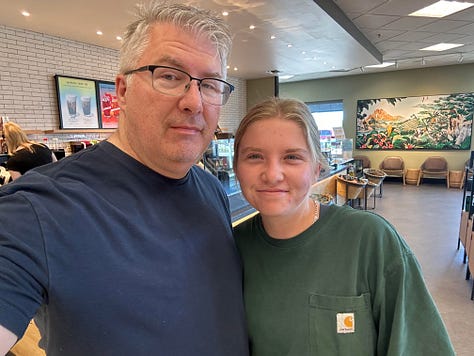


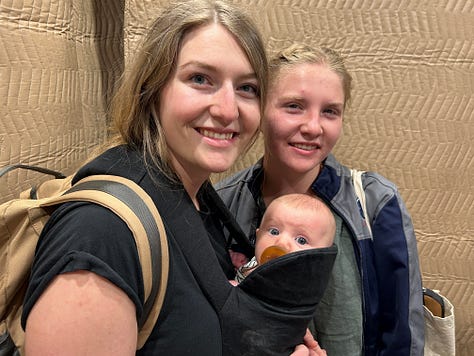
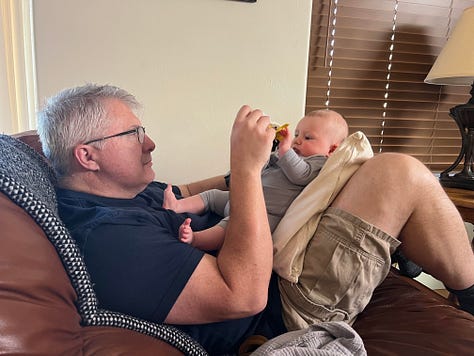




The purpose of last month’s three-and-a-half day trip to Montana was two-fold: 1) get Millie moved into her new place for her summer job (she’s a full-time nanny); 2) snag a quick 24 hours with Maddie and baby Emily (Bruce was shed hunting). Time in the car provided ample opportunity to catch up with Millie on her second year at Covenant College, and Maddie was a most hospitable host, with Emily fielding the majority of conversation and returning jovial banter.
I then flew back into Chicago, where Megan met me and we enjoyed dinner and an overnight at the home of my former 5th grade teacher, Jay Hollingsworth (it had been 35 years since we’d seen each other). The next morning (a beautiful Sunday), we drove a few hours halfway across northern Illinois, arriving in time to preach at Forreston Grove PCA, a 150-year-old church started by German immigrants and surrounded by some amazing Illinois farmland.

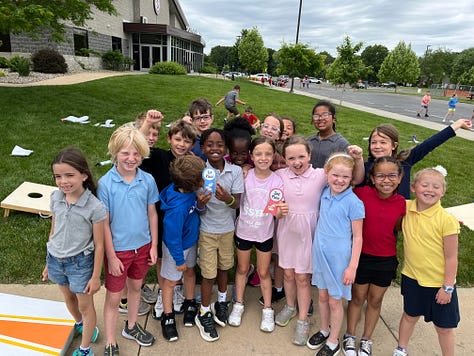
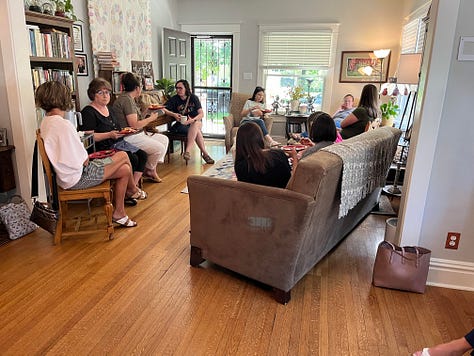
Upon returning to Springfield, we got Megan finished up with school (watch her 18-minute end-of-year video here), attended several graduation parties, a wedding, a funeral, and I spoke at a private memorial, two Memorial Day services, and then preached again at Exodus (below).
We hope that brings you up to speed with the Dunhams. Thanks for praying for our needs and ministry here in central Illinois, and thanks (as always) for reading Second Drafts.
Craig (for Megan)
P.S.: Chloe recently learned that she looks to be just about $3,000 short of her funding goal for her internship with Reformed Youth Ministries at Christ the King Presbyterian in Roanoke. She would be glad for any help to overcome this deficit before moving.
If you might be interested in making a tax-deductible donation in her name, go here, click the drop-down menu, and choose “RYM Church Intern Program/Chloe Crase - Christ the King Presbyterian.” Thank you for your prayerful consideration (her deadline is July 30).
Handing Down Faith
Recently, one of our friends and former pastors, Scott Herron, asked Megan and me to be online guests for an adult discipleship class he was leading called, “Handing Down Faith: Working Together to Hand Down Faith in Jesus.” The class was part of a seven-week series at Trinity Church, our previous church in Bozeman.
Honored by the invitation and because the topic has always been near and dear to our hearts, we tentatively said yes. However, we felt it important to get permission from each of our girls before fully committing, so I emailed them to see what they thought. None of them had hesitations about us doing it, so I then created a Google Doc and asked the girls if they would share with Megan and me any of their perspectives and honest answers to the questions Scott had sent us. A few examples of the questions:
What do you think you did well (discipline, routines, family worship, church attendance, etc.) that helped foster faith in your children?
What do you wish you had done differently that may have hurt or hindered faith in your children?
Why do you think your children all follow the Lord today?
What was your prayer life like during the child years? Teenage years?
How do you parent now that your children are grown? What do you do most to stay connected and minister to and love them?
Over the course of the following week, the girls collectively came up with ten amazing pages of single-spaced notes of thoughtful observations, favorite and funny stories, harder meaningful moments, and a few honest (but gentle) critiques. Reading their words, Megan and I marveled and rejoiced at all God had done in their lives, as well as took the opportunity to ask their forgiveness for some mistakes they felt we made.
Considering their helpful responses, I then contacted Scott and suggested that, if he could work out the logistics with them, an interview with all four girls in place of us might make for a more unique and engaging interview for his class. Scott was open to the idea (as were the girls), and the 48-minute video below was the result.
Maybe because the girls stole our thunder (not really), this month’s Second Drafts includes a few things Megan and I might have said if we had been interviewed, particularly in response to the question, “What do you want to say frankly to parents about the culture around us that you might not say in a 1-1 conversation where you’re trying not to hurt feelings?”
If you only have time for one or the other, watch the video, but if you’re up for more, here are our Top Ten Culture Conversations we’d love to have with young parents.
#10: There Is Nothing New Under the Sun
As the conventional wisdom goes, there supposedly has never been a more challenging time than now to be a parent. But there has never been an ideal time to raise children, either, so good news: you’re not missing out. We’re not saying raising kids is easy, but it’s good to push back on one of the biggest excuses used to give in to apathy or give up altogether.
Slow down; slow your kids down. Savor the stage you are in and if it’s hard, seek to figure out what’s making it hard and try to eliminate some of the outside influences making it hard. Yes, it’s cliche to hear “they are only young once” and “you’ll never get this time back,” but these seasons are fleeting and you will miss them.
#9: “Gentle Parenting” May Not Actually Be So
The concept of “gentle parenting” is a bit of a misnomer, kind of like “Planned Parenthood,” and neither does much actual good for a child. Giving kids a choice and a voice is a reasonable way of relating when kids are older, but only if they have been given a previous foundation of respect for authority within the familial structure.
Few things are more painful to watch than parents badgering and negotiating with children who have long been allowed (and thereby trained) to ignore them. Endless verbal antagonism is more detrimental long-term to the parent/child relationship than physical spanking (done carefully and correctly) ever will be.
Proverbs 13:24 says, “Whoever spares the rod hates his son, but he who loves him is diligent to discipline him.” Don’t hate your child; later on he or she may hate you for your lack of love. We don’t train children so we can control them; we train children so they can control themselves and adjust when necessary (and it will be necessary).
#8: Obedience (Not Redirection) Is the Goal
In much of the current parenting philosophy out there, parents have given up training to obedience and are instead resorting to redirection, utilizing phones and screens as pacifiers for children of all ages for hours on end. This digital mediation subverts parents’ authority as well as robs them of connection with their progeny, particularly when (some, not all) parents are as addicted to their phones and iPads as they’ve made their kids.
Because God expects us to obey (Deuteronomy 5), we should expect and ensure our children obey (Deuteronomy 6). The obedience goal is not compliance but submission; that is, as a father, I could make my children comply because I was bigger than them, but the need was to win their hearts so they would submit to my God-given authority.
The question we see a lot of parents (particularly of young children) wrestling with is, “To what degree do we expect our kids to obey?” We know parents want their children to obey; we know parents hope they will obey. But often children have not been convinced their obedience is non-negotiable (as usually manifested in the increasing number of fits and push backs parents then end up having to tolerate).
Take it from a 2nd grade teacher: if kids grow up thinking that respecting and obeying their parents is optional, that’s what they’ll think about respecting and obeying any other kind of authority (including God).
If Megan and I got anything right (only by God’s grace), it was taking our girls’ daily, immediate, and complete obedience very seriously (especially early on). In doing so, year after year, it became easier to teach, train, and hand down faith, as we at least had an audience trained and expected to listen. That said, it is a multi-year/decade work.
#7: Sharing (Rooms, Toys, Hope, Grief) Is Caring
We never had to teach our girls how to be selfish; on the contrary, we had to teach them (and model ourselves) how to share: rooms, toys, books, phones, cars, each other.
Life didn’t revolve around one particular kid; each had to learn to live in community together. This meant learning to be kind and to be a blessing (not a burden) to each other. The focus was serving each other instead of trying to get others to serve them.
We have not always loved how God has written sadness into our family story the past 10 years. But in His providence, we’ve learned, similar to sharing things, that sharing grief was an important part of growing in our care for each other and others.
The girls grew closer when we lost Megan’s mother 10 years ago to ALS…and when we did foster care for 16 children in two years and had to love without reciprocity…and through multiple moves for both good and hard reasons, learning again (and again) to trust God and each other in transitions from Colorado Springs to St. Louis, St. Louis to Oklahoma City, Oklahoma City to Bozeman, and now far away from one another.
Hard times are often the best times to model and hand down (rather than minimize or hide) family faith. We’re not saying seek out hard times (for surely they will come), but we are saying don’t dismiss or avoid them in the name of comfort or safety.
#6: Children Are Children, Not Peers (Nor Human Trophies)
Raising kids to be people who want to spend time together and with their parents is a gift from God and a sweetness unto itself when it happens. And being friends with our kids may very well be a byproduct of raising them well, but it should never be the goal during the most formative developmental stages of learning who they are within the system of the family.
Nor should raising trophy children. Megan remembers sitting in on a women’s Bible study in the early 2000s when the topic of the challenges of raising children came up (see #10 above). The older woman at her table had good intentions in the advice she was giving, but there was something strange about what she said—we should discipline and train kids so they wouldn’t be an embarrassment to their parents—that didn’t sit well with Megan.
We taught and trained our kids out of a desire for their hearts to reflect love and obedience to the Lord. Would we naturally be embarrassed by them sometimes? Sure—at various times they were preschoolers, toddlers, elementary students, junior highers, high schoolers. But disciplining them for disobedience came out of a desire for their own hearts to be captured by the love of God, not some concern for our reputation (besides, we’re sure we embarrassed them plenty as parents along the way).
In the early days of the mommy-blogging era (of which Megan was a queen), it was easy to use the girls as storytelling illustrations. However, once they got old enough to care about their lives being broadcast online, we felt compelled to ask them first if they were okay with a certain story or two being shared. Then, once social media arrived, the question changed from “Are you okay with this story being told?” to “Are you okay with this picture being shared?” If the answer was “no,” then it was “no.”
Respecting these boundaries with our kids in the still-formative period of their teenage years communicated we cared about them—about their feelings, about their thoughts, and about their preferences. Even now with this newsletter, if it mentions one or all of them in some manner, I send it to them a day early with total veto powers.
#5: Keeping Good Company Is a Good Thing
While we paid attention to where and with whom our kids spent time in person (made easier by finding like-minded and like-hearted parents committed to doing the same), this especially included being vigilant about who they hung out with online and what they watched and listened to with their little eyes and ears.
Our girls remember their children's Bibles, our Christmas nativity set, and the music and shows they took in from when they were very young (The Donut Man, The Prince of Egypt, VeggieTales (the early years), 3-2-1 Penguins) as well as when they were older (Michael Card, Switchfoot, U2, tons of others). The girls were surrounded by Christian influences and ideas in and through what they listened to and watched (though we did try to weed out the ones that were the biggest eye rollers; Miss PattyCake didn’t make Megan roll her eyes nearly as much as she did mine).
At times, we allowed media from PBS (which we probably wouldn’t now) or other secular outlets, but we paid close attention to which shows supported our goals (Between the Lions) and which ones didn’t (believe it or not, the cartoon Arthur portrayed the most whiny, demanding attitudes on television and was verboten).
Most importantly, though, when the girls were younger (but even later on), we spent a great deal of time reading together as a group at night: The Chronicles of Narnia, The Bark of the Bog Owl, all the James Herriot books, and countless others. Megan remembers reading The Little House on the Prairie to Maddie when she was just two, which may have been a bit much developmentally, but teaching a two-year-old to listen and attend while snuggling before an afternoon nap was what got instilled.
During and after these reading times, we did our best to pray with, ask questions, and listen for what the girls were learning, recognizing that time spent reading was as much about being together (and apart from technology) as it was about bringing cherished stories to life, for the best stories are ones written for parents to do just that.
#4: Observe the Village, But Find a Church
No offense to Hillary Rodham Clinton and her book, but we saw the village and decided we didn’t want them raising our kids. Instead, we got help from Christ’s church, which, similar to taking our children’s obedience seriously, was the other thing (again only by God’s grace) we figured out early as key to the parenting equation.
Regardless of where we lived and whichever church we were a part of, we identified faithful older families and were like cats hanging on a screen door watching, imitating, asking for counsel, praying and doing things together, reading the best (not the latest) books about teaching and training children, and doing the hard work ourselves of living lives of faith so as to actually have something to hand down.
We also started serving in the church when the girls were young and it became part of “what we do every week.” Kids model what they see their parents doing, so when you do it together (whatever it is: setting up chairs, preparing communion, holding babies in the nursery, greeting people, visiting the sick or infirmed) it becomes theirs as well.
#3: Push Back Against the Idols of the Modern Parenting Universe
In my 30 years of work as a former camp director, teacher, headmaster, and now pastor wannabe, I’m convinced that the two biggest idolatries plaguing parents (and therefore their children) are convenience and entertainment. With those as idols, phones, memes, and 24/7 access have become sacraments of this self-focused religion.
While Jonathan Haidt has been doing great work in his secular research and writing to encourage parents to limit phones and be present as a counter-cultural act, it’s sad that we as Christians in the church are not leading this charge. I’ve written about this ad nauseam over the decades (yes, decades) here, here, here, and here (among other places), but I am 100% confident that the more we model and train our children to limit and keep technology as a small part of our families, the healthier they will be.
As parents, this is our responsibility. A majority of kids (even young kids: Megan’ had 2nd graders with their own iPhones and unbridled access to the Internet via iPads and laptops at home) are asked to make decisions they have no business making. Believe it or not, children want to hear “no” sometimes; they need to hear “no” sometimes. Kids (young and old) relax when they know and understand there are boundaries but become anxious when they are not old enough or capable of setting them themselves.
#2: Older Kids Need Accessible Counselors, Not Smothering Chaperones
Beginning in the pre-school and elementary years, continuing through junior high, and definitely by high school, we encouraged our girls to advocate for themselves with friends, teachers, and other adults. With rare exception, we did not fight battles for them, but sought to equip and coach them to work toward resolutions on their own.
When they went to college, all responsibilities of doing so—communicating with schools, enrolling, engaging with professors and staff, going to class, meeting deadlines, even paying for the vast majority of their education (one thing we regret not being able/planning better to help with)—was on them. We asked questions, listened to answers, counseled as needed, problem-solved when able, and tried to provide help when wanted, but little of it was done in place of their own agency.
#1: The First Commandment Still Matters
“You shall have no other gods before me.”
—God in Exodus 20:3
We encouraged the girls from a very young age to discover passions and places to solve problems, and to stick with doing both. Through numerous piano lessons, athletic, musical, and theatrical practices, art lessons, and even a manners class, we were dedicated to driving them to their activities and keeping schedules straight. There was a lot of freedom given to pursue interests and we encouraged them to stay as broad as they could for as long as they could in learning what they enjoyed. But all of these activities and hobbies never came before God or going to church.
We brought the girls into the worship service as soon as we could, but it took intention and training. Megan made it fun by making them cute fabric pencil holders that also held a notebook for church notes. We taught the girls that they were expected to listen to the pastor, as well as sing and engage during the service, always standing for God’s Word and with the congregation. These expectations had to be reinforced every single Sunday, but thankfully, that reinforcement (eventually) grew into the girls genuinely loving church and understanding its importance for their lives.
What About Now?
Just because our kids are no longer at home doesn’t mean we’re done being their parents; it just means we do a lot more of two things: ask better questions and pray.
As to Scott’s last question (“How do you parent now that your children are grown? What do you do most to stay connected and minister to and love them?”), here are three more quick practices that come to mind:
We do our best to honor any requests for confidentiality among the girls (which are virtually none), as well as encourage the girls to connect with each other as sisters apart from us (which they do weekly). We try not to put them in compromising situations involving each other or one or the other of us (triangulation is a poison that leads to death in family relationships).
We keep travel and time expectations of them very low so as not to passive-aggressively put pressure on them to visit (their schedules are busier than ours). It’s challenging, but the burden of travel is ours (though they’ve made good effort).
We remind them that, while we are always for them in whatever they do, what’s more important is that they always be for each other since (Lord willing) we will be gone before they will be.
Finally, in response to Scott’s question, “Why do you think your children all follow the Lord today?,” we have no better answer than the one Chloe gave at the end of the video interview: “Ultimately, it’s because Jesus is kind and has rescued our family.”
Yep. That’ll preach.
Thanks be to God.
Review: Taylor Swift’s Tortured Poets Department
“Now I'm down bad crying at the gym
Everything comes out teenage petulance”
—Taylor Swift in “Down Bad”
It may come as a surprise, but as a 53-year-old grandfather, I take Taylor Swift and her music seriously—more seriously than many younger, more hip Christian parents do. That doesn’t make me a Swiftie, but for my Millennial readers, I do consider her “one of your own poets” (a la Acts 17:28) with more to say than some may think I would.
So what do I think? My reviewer friend Adam Holz (an Eras Tour attendee last summer) gets at some of it in his review of The Tortured Poets Department when he simply writes, “romance for Swift is a religion.” This fact seems hard to dismiss over her past twenty years of music, and while the high priestess’ vernacular has become more coarse with time, language is the least of my concerns. Holz continues:
“At the surface level, I really don’t like all the harsh profanity here (more pearl clutching—sorry, Taylor), or the glorification of reckless intimacy. But I think I’m even more discomfited by the underlying worldview that millions upon millions of impressionable girls are ingesting: that romantic love is the capstone human experience.
That’s a worldview that Taylor Swift continues to lean into with all her might. And it’s one that deserves our parental attention and critique, lest it leave our daughters (and probably some sons, too) vulnerable to the kind of emotional devastation that Taylor herself plods through over and over again here.”
Lauren De Witt, writing in Crisis Magazine, has a similar take:
“There’s a reason Gen Z and Gen Alpha love Swift with an ardency that surpasses even that of the Millennials who loved her first: Taylor Swift, though 34, is still ‘feelin’ 22.’ It’s readily apparent that this is a woman entering the latter part of her prime childbearing years who remains lost and alone. She is a billionaire with the world at her feet, but it’s clear she has no real idea what to do with it. She remains emotionally stunted, repeatedly trying to fill the aching cry of her heart with created things and transient romantic relationships.”
I’ll grant that De Witt goes a little far in assuming what she thinks she can about Swift’s heart, ideas, and emotions, but I struggle giving TayTay’s relationship with Kansas City tight end Travis Kelce better than 50/50 odds. For lack of a better phrase (and forgive me for my cynicism but it’s Taylor’s world and we’re all being marketed to in it), marriage and “happily-ever-after” just seem too “off-brand,” at least thus far.
Swift is an average vocalist and musician, but she is a talented wordsmith and performer (though it should be noted she is not the only one). On what I consider the most interesting album track (“Who’s Afraid of Little Old Me?” which show runners of Stranger Things need to appropriate for Eleven’s final season), Swift’s self-awareness of her power and her path to it is spooky and has her winking at herself as much as at the millions of fans she knows she has in the palm of her lyric-writing hand:
“So I leap from the gallows and I levitate down your street
Crash the party like a record scratch as I scream
‘Who’s afraid of little old me?’
I was tame, I was gentle ‘til the circus life made me mean
‘Don’t you worry, folks, we took out all her teeth’
Who’s afraid of little old me?
Well, you should be, you should be”
In Taylor’s version, revenge is best served haunting those who made her the victim.
But the bigger problem here is not one certain song or even this one album (though I would hardly call it her best; Anthology’s 31 songs often feel like top shelf-produced demos bleeding together with more than a few clunkers (“Florida” anyone?)). No, what’s troublesome is the (mostly) less-than-discerning embrace by Christians of a diet of dreary content that Swift and others like her (cf. Billie Eilish’s new Hit Me Hard and Soft) are oozing into the ears and hearts of girls and their affirming mothers (and fathers). At a time when “most teen girls (57%) now say that they experience persistent sadness or hopelessness (up from 36% in 2011)s,” is Swift’s 34-year-old “teenage petulance” what Christian parents want their daughters listening to on repeat?
I’m not trying to bind anyone’s conscience or tell anyone to stop listening to Taylor Swift; like I said at the beginning, because of her artistry and her influence, I take her seriously and am not a hater. I’d even be willing to discuss the matter catching a European leg of The Eras Tour if you’ve got tickets and a private jet (though if my daughters were young again, I’m pretty sure I wouldn’t bring them along).
Instead (and as I would for any of us), I pray she grows and matures in a way that is less “tortured,” both in her life and in the Poets Department. And I would encourage her Swifties (and their parents…or is it their daughters?) to supplement and expand playlists with other artists, for when Taylor sings on “Who’s Afraid of Little Old Me?”…
“So tell me everything is not about me
But what if it is?”
…I want to tell her it’s not, Taylor, it’s just not.
Or it doesn’t have to be…at least not for your fans.
With that in mind, here are three recommendations of talented women who, having also written and recorded good stuff in their 30s, are worthy of a listen for a little variety and a little more redemption. I’ve included an initial track to get you started.
I hope you enjoy. And Swifties, please don’t think me “The Smallest Man Who Ever Lived.”
Peace.
Fresh Linkage
Here are some Peaches-suggested articles without commentary for additional reading:
“Artificial Intelligence: Towards a Christian Perspective” (ByFaith)
“Dr. Fauci’s Testimony Before Congress” (Tangled)
“When Childless Becomes Grandchildless” (Religion News Service)
“Why Conservatives Can’t (And Shouldn’t) Just Ignore Pop Culture” (Evie)
“Why Do So Many Parents Think Kids Need Their Own Bedroom?” (The Atlantic)
Until next time…
Craig and Megan Dunham live in Springfield, IL, where Craig serves as Ministry Coordinator at Exodus Church and is pursuing ordination in the Presbyterian Church in America. Megan teaches 2nd grade at Springfield Christian School and is an occasional newsletter contributor.
Know someone interested in the Dunhams’ ministry in Springfield? Share our newsletter.
Want to contact the Dunhams? Email either or both: Craig and Megan.


